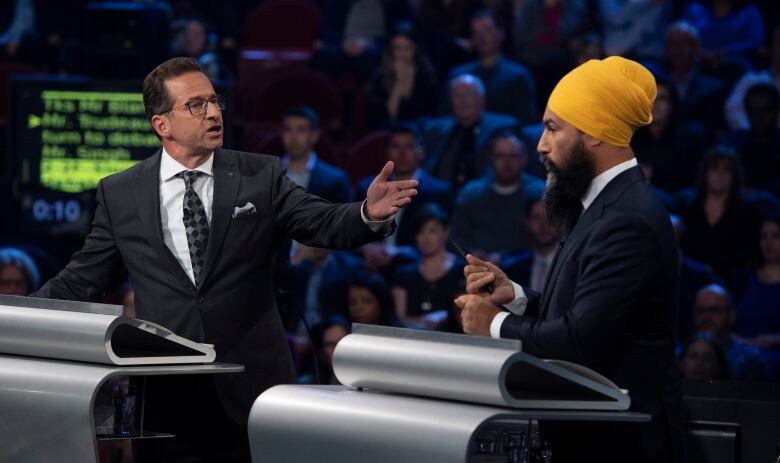Why was the Bloc included in the English debate?
More answers to campaign questions from cellphone voting to where each party got its colours

With the English-language debate behind us, thefederal campaign is now in the home stretch with less than two weeks to go until election day.
Many Canadians are voting already though, by mail, on campus and as of Friday, by advance polls. We've been hearing from many voters through our election texting service, eager to get some answers before they cast a ballot.
Here's some of the interesting things they've beenwondering. If you have any questions you want to add,textELECTIONto22222.
Is there anyone who can't vote?
Obviously, you have to be eligible to vote it's open toCanadian citizenswho areat least 18 on election day and areregisteredto vote.If you don't meet those requirements, you can't vote.
But there is one individual who is prohibited from voting under the Elections Act: Election Canada'sChief Electoral Officer. That job currently belongs to Stphane Perrault.
There are three deputy CEOs who serve under Perrault, who are all allowed to vote if they choose.

Where do the party colours come from?
The Liberal and Conservative parties originate from two 19th-century Canadian political parties which had the party's colours in their name: Parti rouge (French for red) and Parti bleu (which is, you guessed it, French for blue).
For the Greens, it's pretty obvious where the colour comes from. It's in their name!
The People's Party's colour is purple but it wasn't meant to be. The party says it was using blue and red until pollsters, the media and its supporters started using purple and it stuck.
The NDP's orange is a bit more of a mystery. When we asked, the party itself didn't seem to know why it chose orange, but Stephanie Bangarth, an associate professor in history at King's University College, says it's a "quirk of fate."
She believes the party originally wanted red, the traditional colour for social democratic parties around the world but it was taken by Liberals. So they opted for orange instead.
Why was the Bloc included inthe English debate?
For many, Monday night's debate was their first introduction toYves-Franois Blanchet, the new Bloc leader who took the jobin January. And some were confused why he was taking part. After all, the Bloc are onlyrunning candidates in Quebec.
However, the party did fulfil the required two of three criteria outlined by the Leaders' Debate Commission.
- It had elected members in the House of Commons.
- It received more than four per cent of the general vote in 2015.
The other criteria is to run candidates in 90 per cent of the ridings a target the party is not hitting, given that Quebec's 78 seats only count for about 23 per cent of the national total. Thursday night'sdebate will likely matter more to Blanchet. It's the last debate of the campaign and theonly French-language debate with all six party leaders present.

Why don't those vying for prime ministerrelease their tax returns?
Under the Elections Act, leadership candidates, candidates, parties and others have to file financial returns related to elections or leadership contests. But a tax return isn't one of the required documents.
Elections Canada administers the act according to legislation passed by Parliament. It would be up to Parliament to decide to make personal tax return disclosure a requirement.
In Canada, the issue of politicians and public tax returns gained some currency in Manitoba's provincial election in 2016. NDP leader Greg Selinger made his tax return public, and called on other leaders to do the same. Selinger said if re-elected, he would require all MLAs make their tax returns public, along with any offshore holdings. Progressive Conservative leader(now premier) Brian Pallister refused to make his tax returns public, calling it"desperation" politics.
The subject has also come under debate in the U.K. and elsewhere but it's a non-issue in Norway, where all tax returns are available online.
Has a past House Speaker become prime minister?
No. There have been 36 Speakers of the House of Commons but not one has become prime ministers. If Conservative leader Andrew Scheer becomes prime minister, he would be the first.
Scheerserved as Speaker under Stephen Harper's government. He was chosen in 2011 and served until the Conservatives lost in 2015.

Why can't we vote on our cell phones?
Elections Canada has no plans to implement online voting, arguing the risks outweigh the benefits. It says those include:
- Privacy and secrecy concerns: Information could get out about how you voted, for example.
- Fraud:It's possible someone could vote more than once in an online system or vote under a false identity.
- Lack of transparency: With no one present to observe the vote, the public could lose confidence in the process.
That said, online voting is used elsewhere, albeit in very limited ways. Estonia is the only country which allows widespread internet voting, after implementing it nationally in 2007. Switzerland allows it for expats, while the U.S. and Australia use it in very limited ways to allow military personnel to vote.Manyhave studied it, concludingthe cybersecurity risks are too high.
Elections Canada has had electronic voting on its radar since at least the late 90s, but there are hurdles to proceeding with any internet voting pilot projects since Parliament made it more difficult to do so under the Conservative government in 2014. TheElections Act states the Chief Electoral Officer may only test alternative voting processes or technologies with approval from the Senate and the House of Commons.
Until election day, we'll berounding up your questions and answeringsome in articles like the one you just read. If you've got questions,text "ELECTION" to 22222or send Haydn an email athaydn.watters@cbc.ca. He'll try his very best to get you an answer, right to your inbox!
With files from Shanifa Nasser













_(720p).jpg)


 OFFICIAL HD MUSIC VIDEO.jpg)
.jpg)



























































































